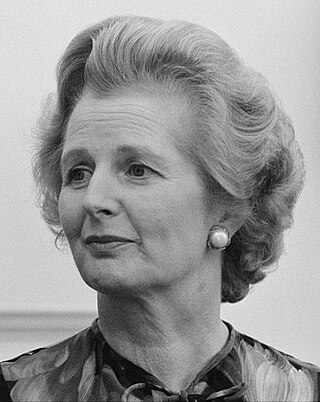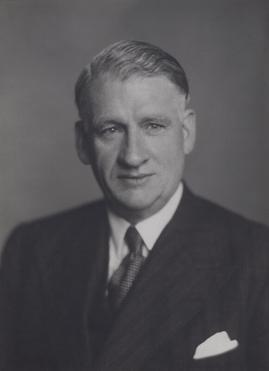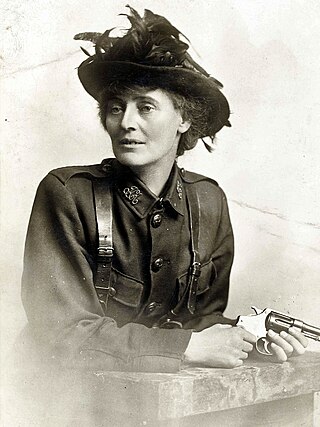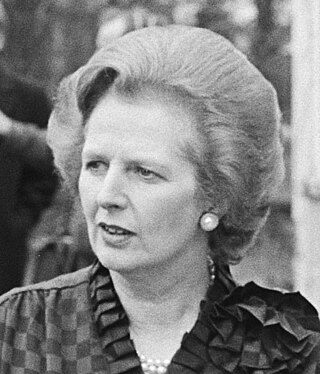Related Research Articles

Michael Mackintosh Foot was a British politician who was Leader of the Labour Party and Leader of the Opposition from 1980 to 1983. Foot began his career as a journalist on Tribune and the Evening Standard. He co-wrote the 1940 polemic against appeasement of Hitler, Guilty Men, under a pseudonym.

Margaret Hilda Thatcher, Baroness Thatcher, was a British stateswoman and Conservative politician who was Prime Minister of the United Kingdom from 1979 to 1990 and Leader of the Conservative Party from 1975 to 1990. She was the longest-serving British prime minister of the 20th century and the first woman to hold the position. As prime minister, she implemented economic policies known as Thatcherism. A Soviet journalist dubbed her the "Iron Lady", a nickname that became associated with her uncompromising politics and leadership style.

Sir Edward Richard George Heath, commonly known as Ted Heath, was a British politician who served as Prime Minister of the United Kingdom from 1970 to 1974 and Leader of the Conservative Party from 1965 to 1975. Heath also served for 51 years as a Member of Parliament from 1950 to 2001. Outside politics, Heath was a yachtsman, a musician, and an author.

Aneurin "Nye" Bevan PC was a Welsh Labour Party politician, noted for tenure as Minister of Health in Clement Attlee's government in which he spearheaded the creation of the British National Health Service. He is also known for his wider contribution to the founding of the British welfare state. He was first elected as MP for Ebbw Vale in 1929, and used his Parliamentary platform to make a number of influential criticisms of Winston Churchill and his government during the Second World War. Before entering Parliament, Bevan was involved in miners' union politics and was a leading figure in the 1926 general strike. Bevan is widely regarded as one of the most influential left-wing politicians in British history.

The 1979 United Kingdom general election was held on Thursday 3 May 1979 to elect 635 members to the House of Commons. The election was held following the defeat of the Labour government in a no-confidence motion on 28 March 1979, six months before the Parliament was due for dissolution in October 1979.

Thatcherism is a form of British conservative ideology named after Conservative Party leader Margaret Thatcher that relates to not just her political platform and particular policies but also her personal character and style of management while in office. Proponents of Thatcherism are referred to as Thatcherites. The term has been used to describe the principles of the British government under Thatcher from the 1979 general election to her resignation in 1990. In international terms, Thatcherites have been described as a part of the general socio-economic movement known as neoliberalism, with different countries besides the United Kingdom sharing similar policies around expansionary capitalism.

The 1992 United Kingdom general election was held on Thursday 9 April 1992, to elect 651 members to the House of Commons. The governing Conservative Party led by the prime minister John Major won a fourth consecutive election victory, with a majority of 21. This would be the last time that the Conservatives would win an overall majority at a general election until 2015 and the last general election to be held on a day which did not coincide with any local elections until 2017. This election result took many by surprise, as opinion polling leading up to the election day had shown a narrow but consistent lead for the Labour Party under leader Neil Kinnock during a period of recession and declining living standards.
One-nation conservatism, also known as one-nationism or Tory democracy, is a form of British political conservatism. It advocates the "preservation of established institutions and traditional principles within a political democracy, in combination with social and economic programmes designed to benefit" the ordinary person. According to this political philosophy, society should be allowed to develop in an organic way, rather than being engineered. It argues that members of society have obligations towards each other and particularly emphasises paternalism, meaning that those who are privileged and wealthy should pass on their benefits. It argues that this elite should work to reconcile the interests of all social classes, including labour and management, rather than identifying the good of society solely with the interests of the business class.

The 1987 United Kingdom general election was held on Thursday 11 June 1987, to elect 650 members to the House of Commons. The election was the third consecutive general election victory for the Conservative Party, who won a majority of 102 seats and second landslide under the leadership of Margaret Thatcher, who became the first Prime Minister since the Earl of Liverpool in 1820 to lead a party into three successive electoral victories.

The SDP–Liberal Alliance was a centrist and social liberal political and electoral alliance in the United Kingdom.

In British politics, Blairism is the political ideology of Tony Blair, the former leader of the Labour Party and Prime Minister between 1997 and 2007, and those that support him, known as Blairites. It entered the New Penguin English Dictionary in 2000. Elements of the ideology include investment in public services, expansionary efforts in education to encourage social mobility, and increased actions in terms of mass surveillance alongside a ramping up of law enforcement powers, both of these latter changes advocated in the context of fighting organized crime and terrorism. Blairites have additionally been known for their contrast with the traditional support for socialism by those believing in left-wing politics, with Blair himself and others speaking out against the nationalisation of major industries and against also heavy regulations of business operations. On foreign policy, Blairism is supportive of close relations with the United States and liberal interventionism, including advocacy for both the Iraq war and the War in Afghanistan (2001–2021).

Clement Attlee was invited by King George VI to form the Attlee ministry in the United Kingdom in July 1945, succeeding Winston Churchill as Prime Minister of the United Kingdom. The Labour Party had won a landslide victory at the 1945 general election, and went on to enact policies of what became known as the post-war consensus, including the establishment of the welfare state and the nationalisation of 20 percent of the entire economy. The government's spell in office was marked by post-war austerity measures; the crushing of pro-independence and communist movements in Malaya; the grant of independence to India, Pakistan, Ceylon, and Burma; the engagement in the Cold War against Soviet Communism; and the creation of the country's National Health Service (NHS).

Iain Dale is a British broadcaster, author, political commentator, and a former publisher and book retailer. He has been a blogger since 2002. He was the publisher of the Total Politics magazine between 2008 and 2012, and the managing director of Biteback Publishing until May 2018. Since September 2010, he has hosted a regular discussion show on the radio station LBC. He was named Radio Presenter of the Year at the Arqiva Commercial Radio Awards in 2013 and 2016. On 28 May 2024, he announced that he was quitting his LBC roles to run as an MP in the 2024 United Kingdom general election, only to abandon his campaign three days later. He returned to his usual LBC slot on 3 June.

Elizabeth Margaret Braddock was a British Labour Party politician who served as Member of Parliament (MP) for the Liverpool Exchange division from 1945 to 1970. She was a member of Liverpool County Borough Council from 1930 to 1961. Although she never held office in government, she won a national reputation for her forthright campaigns in connection with housing, public health and other social issues.

Alfred Edwards was a British politician who served for fifteen years as a Member of Parliament (MP). His origins were as a company director in the foundry industry in Middlesbrough, which led him into conflict with the Labour Party when it proposed to nationalise the iron and steel industries; profoundly unable to support the party, he crossed the floor and became an active Conservative Party supporter.

The representation of women in the House of Commons of the United Kingdom has been an issue in the politics of the United Kingdom at numerous points in the 20th and 21st centuries. Originally debate centred on whether women should be allowed to vote and stand for election as Members of Parliament. The Parliament Act 1918 gave women over 21 the right to stand for election as a Member of Parliament. The United Kingdom has had three female Prime Ministers: Margaret Thatcher (1979–1990), Theresa May (2016–2019), and Liz Truss (2022). The publication of the book Women in the House by Elizabeth Vallance in 1979 highlighted the under-representation of women in Parliament. In more modern times concerns about the under-representation of women led the Labour Party to introduce and, decades later, abandon all-women short lists, something which was later held to breach discrimination laws.

The anti-austerity movement in the United Kingdom saw major demonstrations throughout the 2010s in response to Conservative-Liberal Democrat coalition government's austerity measures which saw significant reductions in local council budgets, increasing of university tuition fees and reduction of public spending on welfare, education, health and policing, among others. Anti-austerity protests became a prominent part of popular demonstrations across the 2010s, particularly the first half of the decade.

When Britain emerged victorious from the Second World War, the Labour Party under Clement Attlee came to power and created a comprehensive welfare state, with the establishment of the National Health Service giving free healthcare to all British citizens, and other reforms to benefits. The Bank of England, railways, heavy industry, and coal mining were all nationalised. Unlike the others, the most controversial issue was nationalisation of steel, which was profitable. Economic recovery was slow, housing was in short supply, and bread was rationed along with many necessities in short supply. It was an "age of austerity". American loans and Marshall Plan grants kept the economy afloat. India, Pakistan, Burma, and Ceylon gained independence. Britain was a strong anti-Soviet factor in the Cold War and helped found NATO in 1949. Many historians describe this era as the "post-war consensus", emphasising how both the Labour and Conservative Parties until the 1970s tolerated or encouraged nationalisation, strong trade unions, heavy regulation, high taxes, and generous welfare state.

"No. No. No." was the response of British prime minister Margaret Thatcher to European Commission president Jacques Delors's proposals for European integration at the October 1990 European Council summit meeting in Rome. Her remarks led to the resignation of deputy prime minister Geoffrey Howe and the ensuing Conservative Party leadership election in which Thatcher was ousted.

The Gang of 25 or the Group of 25 was a cohort of British Conservative Party backbench members of Parliament (MPs) that threatened to vote against prime minister Margaret Thatcher's 1981 Autumn Statement. The statement contained monetarist measures to control inflation. Similar measures introduced since 1979 had reduced inflation but caused job losses in the manufacturing sector.
References
- ↑ "Bevan's speech to the Manchester Labour rally 4 July 1948". Socialist Health Association. 5 July 1948. Retrieved 23 August 2015.
- 1 2 Martin, Paul (1997). "The Vermin Club, 1948–51". History Today . 47 (6). Retrieved 23 August 2015.
- ↑ "£2,000 prize fund to launch creative internet campaigns". ConservativeHome . 26 April 2006. Retrieved 29 April 2017.
Margaret Thatcher was an early member of the Vermin Club.
- ↑ Rowe, David (23 March 2015). "Politics – Flowers and Vermin". The A–Z of Curious Flintshire. The History Press Ltd. ISBN 978-0752493282.
One former Chief Rat was the late Baroness Thatcher.